- Home
- David Gemmell
Bloodstone Page 12
Bloodstone Read online
Page 12
He had seen many such on his travels, cold stone epitaphs to the glory that once had been Atlantis.
Another memory came to him then, of a man with a golden beard and eyes the color of a clear summer sky.
Pendarric. The king.
And he recalled with great clarity the day when the Sword of God had torn across the curtain of time. Reining in his horse, he gazed with fresh eyes on the ruins.
“I destroyed you,” he said aloud.
Time’s portals had been opened by Pendarric, the ruler of Atlantis, and Shannow had closed them by sending a missile through the gateway. The world had toppled, tidal waves roaring across the continent. The words of Amaziga Archer floated up from the hidden depths.
“You are not the Jerusalem Man any longer, Shannow. You’re the Armageddon Man!”
Shannow turned his back on the ancient city and headed southwest. It was not long before he saw the Hankin house. There was no body outside, but there was fresh blood on the dust of the yard. As he rode in, a tall man with a sandy beard came walking from the house, a rifle cradled in his arms.
“What do you want here?” he asked.
“Nothing, friend. I am on my way to Domango and thought I’d stop for a little water, if it is not inconvenient to you.” Shannow could not see the second man at the window, but he saw a rifle barrel showing at the edge of the curtain.
“Well, be quick about it. We don’t like Movers here.”
“Is that so? When last I stopped here, there was a man with two children. Has he moved on?”
The man’s eyes narrowed. “Yes,” he said at last. “He moved on.”
“Do you own the property now?”
“No, I just been told to watch over it. Now get your drink and be gone.”
Shannow dismounted and led his horse to a trough by the well. Loosening the saddle girth, he wandered back to where the man stood. “It is a fine place,” he said. “A man could raise a family here and never tire of looking at the mountains.”
The sandy-haired rifleman hawked and spit. “One place is pretty much like another.”
“So where did he move on to … my friend with his children?” asked Shannow.
“I don’t know anything about it,” said the rifleman, growing more uneasy.
Shannow glanced down at the dust and the stains that peppered the ground.
“Slaughtered a pig,” said the man swiftly. The second man moved from the house. He was powerfully built, with a bulllike neck and massive shoulders.
“Who the hell is he, Ben?” asked the newcomer, his right hand resting on the butt of his scabbarded pistol.
“Stranger riding for Domango. He’s just watering his horse.”
“Well, you’ve done that,” he told Shannow. “Now be on your way.”
Shannow stood silently for a moment, holding back his anger. There was no movement in the house, and he guessed that these two men alone had been left to guard the property. All his life he had known such men: hard, cruel killers with no understanding of love or compassion. “Were either of you party to the murder?” he asked softly.
“What?” responded the rifleman, eyes widening. The big-shouldered man took a step back and made a grab for his pistol. Shannow shot him in the head; he stood for a moment, eyes wide in shock, then toppled to the bloodstained earth. The Jerusalem Man’s pistol swung, the black eye of the barrel halting directly before the other man’s face.
“Jesus Christ!” said the rifleman, dropping his weapon and raising his hands.
“Answer the question,” said Shannow. “Were you party to the murder of Meneer Hankin?”
“No … I never shot him, I swear to God. It was the others.”
“Who led the killers?”
“Jack Dillon. But Hankin, he never had no Oath papers, and no one would stand up and speak for him. It was the law. He was told to leave; he brung it on himself. If he’d just gone, none of this would have happened. Don’t you see?”
“And this Dillon has now laid claim to the property?”
“No. It’s held for Jacob Moon. Please, you’re not going to kill me, are you?” The man fell to his knees and began to weep.
“Did Meneer Hankin weep and beg?” asked Shannow. He knew he should kill this man. More than that, he knew that the old Jon Shannow would have done so without a second thought. Holstering his pistol, he moved to his horse.
“You son of a bitch!” the man screamed, and Shannow turned to see that he had gathered up his rifle, which was now pointed in Shannow’s direction. “You bastard! Think you’re so tough? Think you can just ride in here and do as you like? Let’s see how tough you act with a bullet in your guts.”
Smoothly Shannow stepped to the right, palming his pistol as he moved. The rifle shot slashed past him on the left, cutting through his coat. Shannow fired, and the rifleman pitched backward, the weapon flying from his hands. Hitting the ground hard, the man grunted once; then his leg twitched, and he was still.
“You have become a fool, Shannow,” said the Jerusalem Man.
The land to the east was vast and empty, the plain dry, the grass yellow-brown. He could see where once there had been rivers and streams, but they were long gone, evaporated by the searing heat of the sun. After an hour of riding he saw the broken hull of a rusted ship jutting from the desert that stretched away to the horizon and beyond, grim evidence that this had once been the ocean floor.
Shannow skirted the edge of the desert and after another hour began the long climb up into the higher country. Here there were green trees, and grass, and a wide, well-used road that angled down toward the distant town of Domango.
The sun was high in the sky, and Clem was enjoying the freedom of the ride. Meg was a gentle woman and a fine wife, but he had felt trapped at the ranch in Pernum. The thought made him feel guilty. His life at the ranch had brought him everything he thought he had ever wanted: security, status, and love. So why had it not been enough? When the locusts had wiped out his crop five years earlier, he could have worked on, laboring through the long hours of daylight. The merchants in town all liked him, and they would have extended his credit. Instead, he had run away and taken to the road.
The first robbery had been easy: two men carrying a shipment of Barta notes to Pernum. Clem had ambushed them on the mountain road, shooting the first through the shoulder. The second had thrown away his gun. Twelve thousand he had made that day.
After that everything had gone to hell in a bucket. Half the cash had been sent to the banker in Pernum who held the mortgage on the farm. The rest had gone to Meg.
Nothing had been easy from that moment on.
“What was he like?” asked Nestor, the words cutting through Clem’s thoughts. They were no more than an hour’s ride from the settlement of Purity, and Clem could already see the smoke from the town’s factories drifting lazily into the blue sky.
“What’s that, lad? Did you say something?”
“The Jerusalem Man. What was he like?”
Clem thought about the question. “He was grim, Nestor. Mighty grim. Unpredictable and deadly. Pilgrim’s Valley was a new settlement then. There was no Deacon, no natural unified government. Settlers just headed out into uncharted lands and built their farms. Merchants followed them, and soon there were towns. We stopped in Pilgrim’s Valley, just short of the Great Wall. Now, that was a sight to behold.”
“I seen it,” said Nestor. “But what about Jon Shannow?”
Clem laughed. “By God, boy, I do so like the young. That wall was built twelve thousand years ago, and beyond it there was a city where men became lions. And in the sky, shining bright, there was the Sword of God. Hell of a thing, Nestor. Anyways, the demons of the pit were released around then, walking snake-men.”
“I seen one of those, too,” said Nestor. “They got one down in Unity, on display. And several skeletons.”
“I’ve seen that, too,” Clem mimicked, growing irritated by the interruptions. “But what you won’t know is that the ki
ng of these demons sent three special men to kill Shannow. Great warriors, fearless and lightning-fast with pistols. Shannow killed the first, but the other two kidnapped Frey McAdam and took her to where the sword was hanging in the sky.”
“Why’d they take the headmistress?”
“God’s blood, Son, will you just listen?”
“I’m sorry, sir.”
“They kidnapped Beth because she was close to Shannow. They wanted to bring him to them. And they did just that. But it didn’t take ’em long to wish they hadn’t. I’d been wounded, but I followed them anyway. I come on the scene just as Shannow had given himself up. Suddenly there was guns blazing. I took down one, but the best of them was facing up to the Jerusalem Man. Shannow just stood there like he didn’t have a care in the world—calm, powerful. Then it was over. I tell you, boy, I wouldn’t want to face him.”
“He was that fast?”
“Oh, it wasn’t the speed. I’m faster than ever he was. It’s the sureness. Strange man—holds himself in chains of iron.” He glanced at Nestor. “You know why he hates brigands and killers?” The boy shook his head. “Because deep down he is one. A natural. You see, most men hesitate when it comes to killing. I think that’s a good thing, generally. Life is precious, and you don’t want to take it away from someone over a whim. I mean, even a brigand can change. Look at Daniel Cade. There wasn’t a more murderous bastard than him, but he saw the light, boy. And he fought the Hellborn. So, like I said, life is precious. But Shannow? Cross him and you die. It’s that simple. That’s why brigands fear him. He deals with them just like they deal with others.”
“You talk about him like he’s alive. But he ain’t, is he? He went up to heaven years back.”
Clem hesitated, anxious to share the secret he had kept hidden for twenty years. “He is alive to me,” he said. “I never saw him die, and I never saw no fiery chariot, neither. But I watched him tame a wild town. You’ve never seen the like.”
“Wish I had,” said Nestor. “I’d love to have met him—just once.”
Clem laughed again. “If wishes were fishes, poor men wouldn’t starve. How long have you known the Preacher?”
“All my life. Quiet man. He used to live with Frey McAdam, but she threw him out. Then he had a little place behind the church. He gave some good sermons … always kept you awake in church. Well, until he started letting Wolvers in, that is. Most people stopped going then. If he’d been a stronger man, he’d have kicked those Wolvers out. Then there would’ve still been a church.”
“What’s strength got to do with it?”
“Well, everybody in town got mighty sick of it, and they told him so. But I guess he just didn’t have the nerve to order the Wolvers away. Some men just don’t take to confrontation.”
“I guess not,” said Clem. “Did you like him?”
Nestor shrugged. “Didn’t like him or dislike him. Felt sorry for him mostly. Shem Jackson hit him once, knocked him into the mud. The Preacher just got up and went on his way. I was ashamed for him then. I still can’t believe how he shot down all them raiders. Guess he must have surprised them.”
“A surprising man,” agreed Clem.
6
Evil will always rise like scum to the surface, for an evil man will seek to impose his power on others. All the governments in history have seen evil men gain ascendancy. How, then, do we ensure that the rule of evil is forever banished from this new land? We cannot. All we can do is strive for holiness and seek out, individually, the will of God. And we can pray that when evil rises, there will be men, aye, and women, who will stand against it.
The Wisdom of the Deacon
Chapter XXII
ISIS STOOD BEFORE the broad desk and stared at the Crusader, trying to hold on to her temper. The man had small, bright eyes and a face that seemed to her to show cruelty and arrogance. “You have no reason to lock up our doctor,” she said.
“When the Oath Taker gets here, we’ll see what’s right,” he said. “We’re not partial to Movers here. We don’t like thieves and skulkers in Domango.”
“We are not thieves, sir. We came into town looking for work. I am a seamstress, our leader Jeremiah is a tailor, and Doctor Meredith is a physician.”
“Well, now he’s a prisoner.”
“Of what is he accused?”
“Begging. Now be on your way or I’ll find a nice cell for you.” His eyes raked her figure. “Maybe you’d like that,” he said, leering.
“I doubt that she would,” said a cold, deep voice, and Isis turned to see Jon Shannow standing in the doorway. Moving inside, he walked past her without a word and stood before the broad desk. “I am here to report a murder,” he said.
The Crusader leaned back in his chair, linking his hands behind his head. “A murder, you say? Where and when?”
“About three hours’ ride northeast of here. A man named Hankin. Shot to death by a group of riders.”
Isis saw the change of expression on the Crusader’s face. The man sat up straight. “How do you know there was a murder?” he asked. “Did you see it?”
“His children saw it,” said Shannow.
“And where are they now?”
“Safe,” Shannow told him.
“You saw the body?”
“No. But I believe the children.”
The man fell silent, but the fingers of his right hand began tapping nervously on the desktop. “All right,” he said at last, “this’ll have to wait until the captain gets back sometime this afternoon. Why not get yourself something to eat and come back later.”
“Very well.” Shannow swung and left the office, and Isis followed him.
“Wait!” she called as he stepped off the boardwalk. “They’ve got Doctor Meredith in there!”
“It would be better for you to avoid me,” said Shannow. “There is evil here, and it will draw unto me.”
Isis was about to reply, but he walked away across the wide street toward an eating house on the far side.
“You know that man?” asked the Crusader, moving alongside her.
“No,” she said. “He rode by our wagons some days back, that’s all.”
“Well, steer clear of him. He’s trouble.”
“Yes, I will,” said Isis.
Inside the small eating house Shannow sat with his back to the wall. There were three other diners: a thin, balding man who was reading a book, having finished his meal; a thickset young miner with his left arm in a sling; and a slim, dark-eyed black man who was nursing a hot mug of Baker’s. Dismissing the other two from his mind, Shannow concentrated on the young black man. He was wearing a coat of dark gray wool over a white shirt, and Shannow could see the enameled butt of a revolver in a shoulder holster on his left side.
A tall black woman approached Shannow’s table. “We got good steaks, some fresh-laid eggs, and new bread from the oven this morning,” she said. “Or else there’s what’s printed on the board.”
Shannow glanced up at the blackboard and the dishes and drinks scribbled in chalk. “I’ll have bread and cheese and some warmed milk, if you please.”
“You want honey in the milk?” she asked him.
“That would be pleasant.”
As she walked away, his thoughts returned to the meeting in the office. The Crusader’s reactions had been wrong. There had been no surprise when Shannow had mentioned the murder, and the man’s twin concerns had been the whereabouts of the children and whether Shannow had seen the body. When the waitress returned with a mug of sweetened milk, Shannow thanked her, then asked in a low voice, “There is a man in this area named Jack Dillon. How will I know him?”
“Best if you don’t,” answered the woman, walking away. As she passed the table of the slim black man, Shannow saw her bend her head and whisper something to him. The man nodded, then rose and walked toward Shannow’s table. Reversing a chair, he sat down opposite the Jerusalem Man.
“Dillon’s big and he’s bald, and he sports a thick beard,” said
the newcomer. “Is that a help?”
“Where will I find him?”
“If you are looking for him, my friend, he will find you. Seeking to work for him, are you?”
“What would make you think so?”
“I know your kind,” said the black man. “Predator.”
“If that is the case,” said Shannow with the briefest of smiles, “then are you not walking a perilous path by insulting me?”
The man chuckled. “All life involves risk, friend. But I think it is minimal in this situation. For you see, I am armed—and facing you.” His dark eyes were gleaming, and the fact that he held Shannow in contempt was all too obvious. “What do you say to that?”
“A fool uttereth all his mind, but a wise man keepeth it in,” Shannow told him. “Beware, boy; it can be fatal to make hasty judgments.”
“You calling me a fool?” The black man’s hand was hovering over the enameled pistol butt beneath his jacket.
“I am stating a fact,” said Shannow, “and if you listen very closely, you will hear the sound of a pistol being cocked.” The double click of the drawn-back hammer sounded from below the table. “You seem very anxious to cause trouble, young man,” continued Shannow. “Could it be you have been sent to kill me?”
“No one sent me. I just despise your kind,” the man answered.
“The young are always too swift to judge. Did you know a farmer named Hankin?”
“I know him. Men like you forced him off his place. Couldn’t find three people to give Oath for him.”
“He was murdered,” said Shannow. “Shot to death, his children hunted like animals. I am waiting to see the captain of the Crusaders; then I shall file a complaint against Jack Dillon.”
The black man leaned forward, elbows on the table. “You really don’t know anything about Dillon, do you?”

 Bloodstone
Bloodstone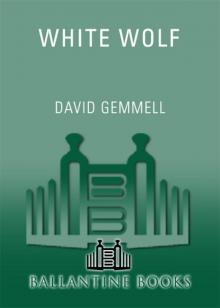 White Wolf
White Wolf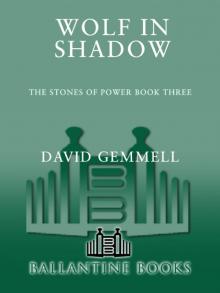 Wolf in Shadow
Wolf in Shadow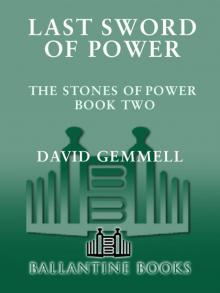 Last Sword of Power
Last Sword of Power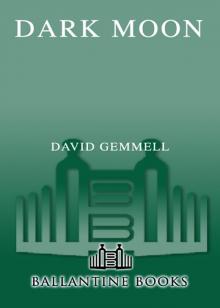 Dark Moon
Dark Moon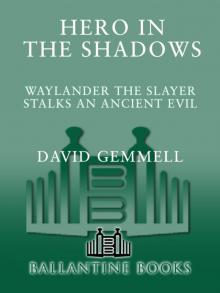 Hero in the Shadows
Hero in the Shadows Gemmell, David - Drenai 09 - Hero In The Shadows
Gemmell, David - Drenai 09 - Hero In The Shadows Waylander
Waylander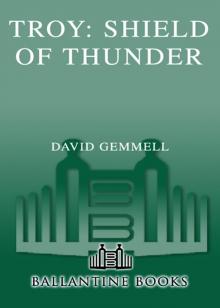 Shield of Thunder
Shield of Thunder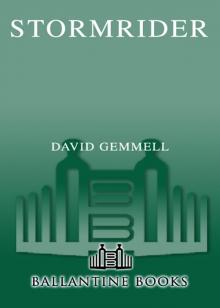 Stormrider Stormrider
Stormrider Stormrider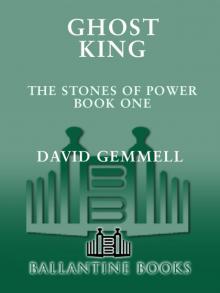 Ghost King
Ghost King Legend
Legend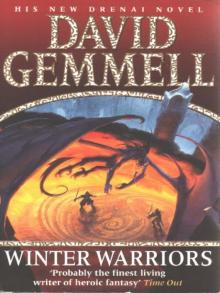 Winter Warriors
Winter Warriors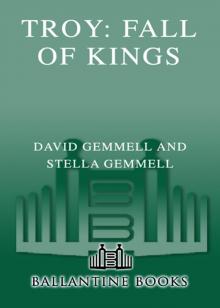 Fall of Kings
Fall of Kings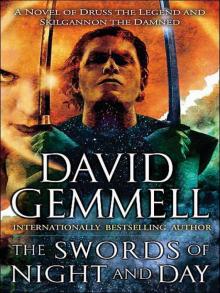 The Swords of Night and Day
The Swords of Night and Day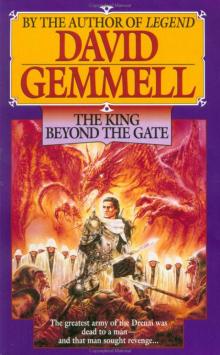 The King Beyond the Gate
The King Beyond the Gate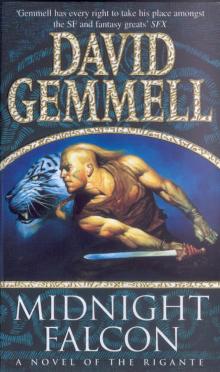 Midnight Falcon
Midnight Falcon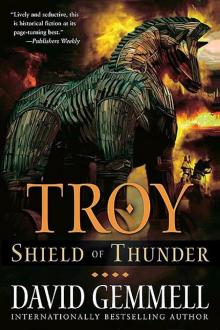 02 - Shield of Thunder
02 - Shield of Thunder In the Realm of the Wolf
In the Realm of the Wolf Ravenheart
Ravenheart The First Chronicles of Druss the Legend
The First Chronicles of Druss the Legend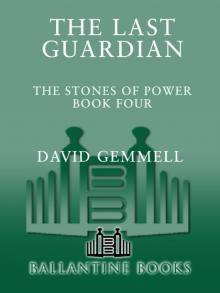 Last Guardian
Last Guardian Stormrider
Stormrider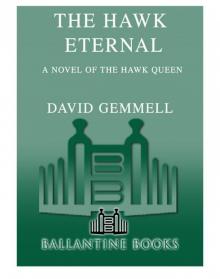 The Hawk Eternal
The Hawk Eternal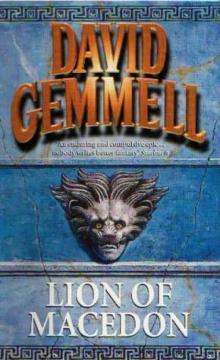 Lion of Macedon
Lion of Macedon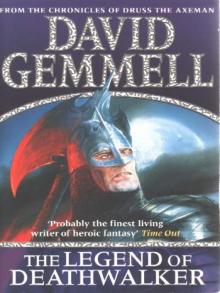 The Legend of Deathwalker
The Legend of Deathwalker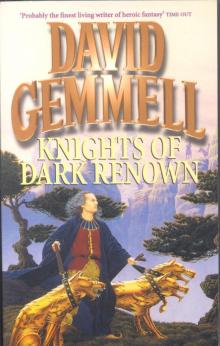 Knights of Dark Renown
Knights of Dark Renown Echoes of the Great Song
Echoes of the Great Song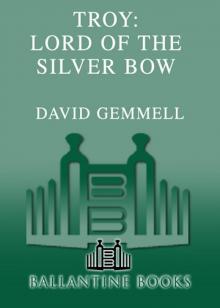 Lord of the Silver Bow
Lord of the Silver Bow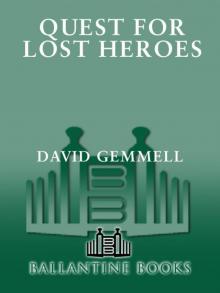 Quest for Lost Heroes
Quest for Lost Heroes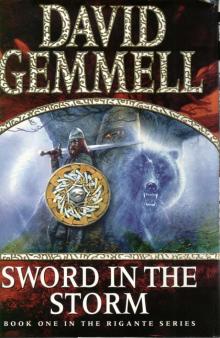 Sword in the Storm
Sword in the Storm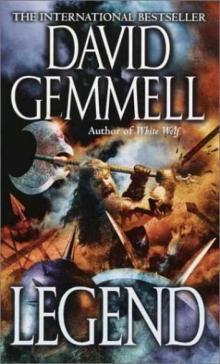 Drenai Saga 01 - Legend
Drenai Saga 01 - Legend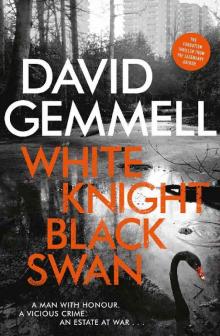 White Knight/Black Swan
White Knight/Black Swan![[Troy 02] - Shield of Thunder Read online](http://i1.bookreadfree.com/i/03/19/troy_02_-_shield_of_thunder_preview.jpg) [Troy 02] - Shield of Thunder
[Troy 02] - Shield of Thunder Lord of the Silver Bow t-1
Lord of the Silver Bow t-1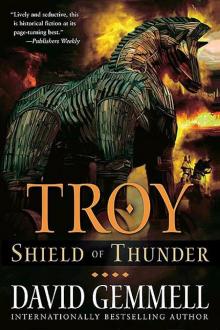 Shield of Thunder t-2
Shield of Thunder t-2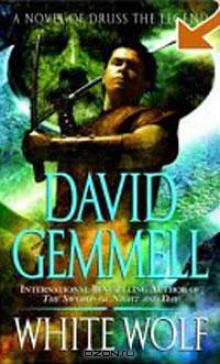 White Wolf: A Novel of Druss the Legend dt-10
White Wolf: A Novel of Druss the Legend dt-10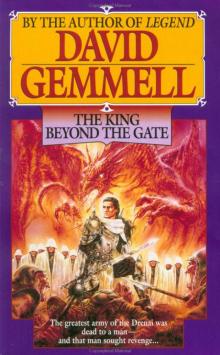 Drenai Saga 02 - The King Beyond the Gate
Drenai Saga 02 - The King Beyond the Gate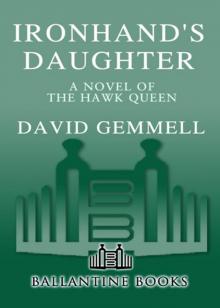 Ironhand's Daughter
Ironhand's Daughter Gemmell, David - Drenai 06 - The First Chronicles of Druss the Legend
Gemmell, David - Drenai 06 - The First Chronicles of Druss the Legend The Last Guardian
The Last Guardian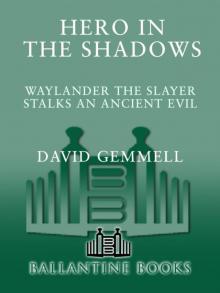 Hero in the Shadows: A Waylander the Slayer Novel
Hero in the Shadows: A Waylander the Slayer Novel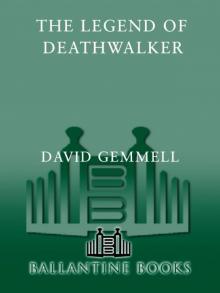 The Legend of the Deathwalker
The Legend of the Deathwalker